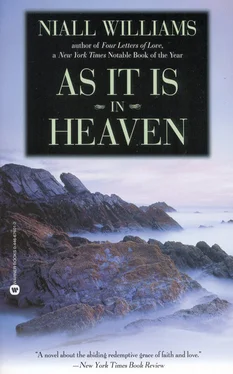“No,” he said, “you did not.” And he left it at that, taking the fifteen pounds for the petrol and adding nothing of his own story, the fading fable of how once he had held the world record for holding his breath and imagined that the vast populations of everywhere admired him for it.
He waved off the car and watched it go into Killarney and the mountains. Then he walked back to the small seat inside the door of the shop, to watch the world becoming smaller and the wonderful weather arriving in the sky.
It was late afternoon by the time Stephen drove the winding road out of Killarney past the lakes and into the mountains. Here was a road with no shop or houses, a rising thread of grey through the thickening greenery and the rock. Streams ran across the roadway and fell farther towards the mirrors of the lakes below. It was a road in fairyland. A timeless way out of the pages of children’s tales. It wound like a spell, climbing all the time through a green hush that was older than Aesop. That November afternoon there were no cars ahead of Stephen or behind him. He was driving so slowly that arrival seemed to move ahead of him uncertainly. He rolled down the window and felt the cool air like a damp lusciousness enter the car. It was as if he were moving barefoot in deep undergrowth, and the smell of pine had cleared his mind to a serene vision of Gabriella playing the violin. He did not know that he was driving now in the places where she had walked, or that sometimes she had played the violin high among the trees on the sides of those mountains. He did not know it, but heard nonetheless in the thin purity of the air the notes that she had left.
In that verdant and ancient loveliness the yellow car crawled on, moving through a place where it was less difficult to believe there was a spirit that loved the world.
At half past four in the afternoon Stephen arrived in Kenmare. He drove down off the mountains with a falling mist closing in behind him. By the time he arrived at the top corner of the triangular town, the mountains themselves had disappeared, like the toys of God. Drifts of soft drizzle moved in the air, dampened the pink faces of the townspeople, and made their radios crackle. He had no idea exactly where to go. He walked along the footpath, past the shops, his heart fluttering with the bird within him. He tried to amble, to walk with pretend interest along the street, while all the time anxiety roiled his stomach. It was only when he was already out of the car and walking in Kenmare that the possibility of meeting Gabriella on the street dawned on him. He stopped and tried to swallow the sharp pieces of his panic; he thought of retreating, acting a small pantomime of forgetting something and urgently running back along the path. Having driven a hundred miles, he was suddenly terrified to meet her. What if she was there in front of him, walking her shopping home? An appalling sense of the outlandishness of it froze him to the ground; of seeing a woman play a violin and then dropping everything, abandoning a life and driving off like a latter-day Lancelot into the mountains to see her again. He had a surging sense of the absurd anachronism of romance, of its implausible and obsolete currency in the world, as though it belonged to ancient history and, along with words like Valour and Honour and Truth, was credible only in fables. His black hair fell down in front of his eyes as he studied around his feet the running rain stains that looked like maps of lost countries. He stood there in his thick coat and told himself again that he was not there to speak with her, that he had come because he wanted to hear her play again, because he wanted to watch her, and in that watching was a kind of healing he could not explain. He reasoned it in a slow argument like a practising solicitor and tried to climb the specious rungs of logic until it did not seem absurd.
He was standing, arguing the case of himself, when Nelly Grant saw him from the vegetable market across the street. When he moved off the wet space he had been standing in and walked down the path again, she saw the strange hesitation in his manner, the way he shuffled along half-turned from the people coming against him, and was at once suspicious of his contorted energy.
A man like that, she thought, needs plums.
It was another twenty minutes before he arrived back up the other side of the street to her shop. Later, Stephen would tell himself that he had stepped in the door because it was open and not because he wanted fruit. But the moment he appeared before her Nelly Grant already recognized in the twisted shambles of his body the jangling and unaccommodated condition of his spirit. All his organs are in deep stress, she thought, and smiled at him as he fingered an apple on the side of the stack.
“Quiet time of year for a visit,” she said across to him.
“I’m sorry?”
“Taking a small holiday? It’s a good time for it. Kenmare is too busy now in the summers. Though I shouldn’t be complaining, should I? But it’s nice and quiet now. You’ll get a nice few days if the mist lifts. Which it will too, I’d say.” She paused and looked at him. “Try a few plums,” she suggested lightly, and raised her eyebrows with her voice as if approaching a delicate bridge between them. “Try one, they’re lovely. Taste of autumn in them.”
And he did. He bit the plum, and lifted his head for the first time as the juice ran down his chin.
It’s worse still, thought Nelly Grant when she saw the egg-yolk hue of his tongue and the lifeless colour of his teeth. She had to turn for a moment to the shelf behind the counter where she kept the vitamin and mineral supplements. She moved two jars of A and E and recalled it was Tuesday last since she had checked her own tongue for the pinkness of her life force.
“I need …”
“Yes?” She turned, like luck.
Stephen scratched his forehead, and small skin cells flaked falling in the shop light. He looked to the right in a loop of hesitation, but Nelly Grant came forward and with her the affirming scent of cinnamon oil that was burning in pottery by the register.
The loop unknotted.
“I need someplace to stay.”
“Oh yes,” said Nelly. “Well, there’s still a few places that stay open all year round. I have a card here for …” She turned to the crowded noticeboard behind her, but stopped when the man behind her spoke.
“There’s a hotel here,” he said. His voice was skipping like a record and he had to swallow hard before he added quickly, “It’s called … The Falls, The Falls Hotel.”
“That’s right.” Nelly Grant turned and looked at him, detecting only now the burden of secrecy he carried.
“I don’t want to go there. Not stay there. I mean I just — It’s not far, is it?”
“Oh no. It’s just up the street,” she said.
“Right. That’s fine. Thank you. There’s em …” Stephen felt his transparency like a face blemish and half-turned towards the door while Nelly Grant blew the scent of the cinnamon softly forward once more. “There is, there are … em … concerts there sometimes?”
“Oh, there are,” she said.
“Good. Good.” He nodded and drew breath like the drowning, and it was a few moments before he realized that he was standing at a shop counter but had nothing to buy.
“Do you want this, it’s Mary White’s place. Very nice and comfortable,” said Nelly Grant, holding out the card. “It’s not far from the hotel,” she added, already a half-conspirator in the plot of his loving.
Stephen took the card and thanked her, then tried to repay the graciousness of the woman by going over to the nearest stall and taking a bag of apples. Then a bag of oranges. Then a clutch of green bananas.
My God, thought Nelly as she watched him, he has hardly ever bought fruit. Plums, she knew, were the fruit for him, and she tried to guide his body towards them with the energy of her mind. This man has no balance, and plums are the fruit of balance; the softness of the flesh to the solidity of the stone hints at it, the perfect proportion of the stone to the fruit tells it even more clearly. Peaches work in the same way for people of southern climates, but it is plums, thought Nelly Grant, that balance the Irish. Pick a plum. Pick a plum.
Читать дальше











